Using VPNs today is just a matter of going to the service’s website, downloading and installing the app, and then launching the software to connect to a server. However, the only problem is that today’s market offers dozens of VPN options, all claiming to be the best. This guide will simplify those options.
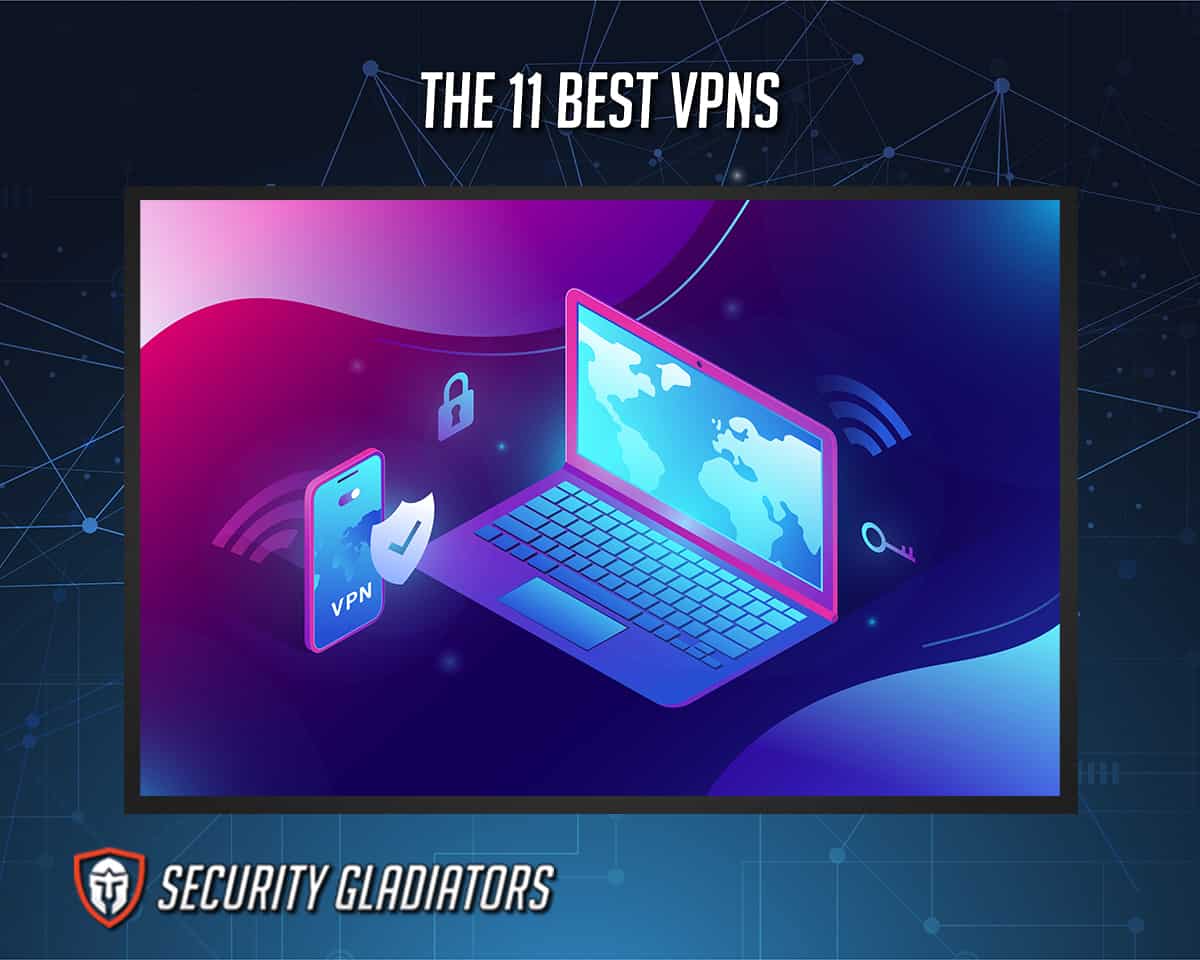
The best VPNs for 2023 are given below.
- NordVPN – Best VPN for Privacy
- CyberGhost – Best VPN for Torrenting
- IPVanish – Best VPN for Windows
- ExpressVPN – Best VPN for iOS
- Surfshark – Best VPN for Android
- ProtonVPN – Best VPN for Zoom
- Hotspot Shield – Best VPN for Chromebook
- Atlas VPN – Best Data Breach Monitoring
- Private Internet Access VPN – Best VPN Crypto Trading
- Norton Secure VPN – Best VPN with Dynamic IP Addresses
- Ivacy – Most Affordable
1. NordVPN – Best VPN for Privacy

NordVPN has been one of the most popular and well-reputed VPNs in the world for the past decade because of the quality of the service. NordVPN’s advantages include reliable server performance, consistent unblocking of streaming services such as U.S. Netflix and Amazon Prime Video, unique protocols such as NordLynx and good discounts. The disadvantages of NordVPN, however, include a slightly resource-heavy Windows app, some buggy features and a lack of a dedicated Linux app.
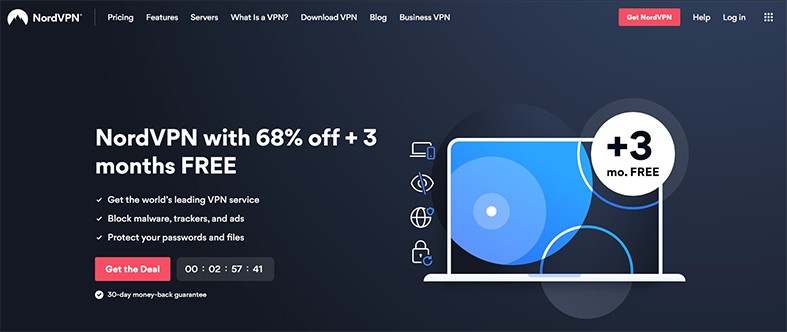
The monthly plan is the most expensive option in NordVPN’s subscription lineup, at $14.19 for the “Complete” plan, $12.89 for the “Plus” plan and $11.99 for the “Standard” plan. Selecting the one-year plan brings down the cost to $7.19 per month for Complete, $5.89 per month for Plus and $4.99 per month for Standard. Finally, the two-year period for each of the three plans offers the greatest discount (up to 68%), with $5.29 per month for the Complete plan, $3.99 per month for the Plus plan and $3.09 per month for the Standard plan. All packages come with a 30-day money-back guarantee.
| Term | Monthly Plan | One-Year Plan | Two-Year Plan |
|---|---|---|---|
| Complete Plan | $14.19 | $7.19 per month | $5.29 per month |
| Plus Plan | $12.89 | $5.89 per month | $3.99 per month |
| Standard Plan | $11.99 | $4.99 per month | $3.09 per month |
NordVPN is one of the few VPN services in the market today with a high trust rate. Almost all reputable resources rank NordVPN highly for security, privacy and the ability to unblock geo-restricted content. As Security Gladiators covered in the full NordVPN review, the software has also undergone independent audits to verify the stated claims. The service operates under the jurisdiction of Panama, which is not part of any data-sharing alliance.
NordVPN currently holds a rating of 4.4 out of 5 stars on Trustpilot, with a verified company tag, over 21,000 reviews and an average rating of “Excellent.” On the Google Play Store (for Android devices), NordVPN has a rating of 4.5 stars out of 5 after 606,000 reviews and over 50 million downloads. Additionally, NordVPN is rated 4.7 out of 5 stars on the Apple App Store with over 3,800 ratings. On the Chrome Web Store, NordVPN has a slightly lower rating of 3.5 out of 5 stars after 2,655 ratings and over 1 million downloads. Finally, on the Mozilla add-on website, NordVPN earned 3.5 stars out of 5 after 1,556 reviews and over 108,000 downloads.
2. CyberGhost – Best VPN for Torrenting

CyberGhost is one of the top VPN services that is especially suited for internet users who download large files from torrent websites. The main advantages of CyberGhost are a long money-back guarantee (45 days), a huge server network, the ability to unblock streaming sites (BBC iPlayer, U.S. Netflix, Amazon Prime), a free extension and good discounts. CyberGhost also comes with certain disadvantages, such as an incomplete ad blocker, relatively slower mobile apps and inconsistent speeds on some servers.
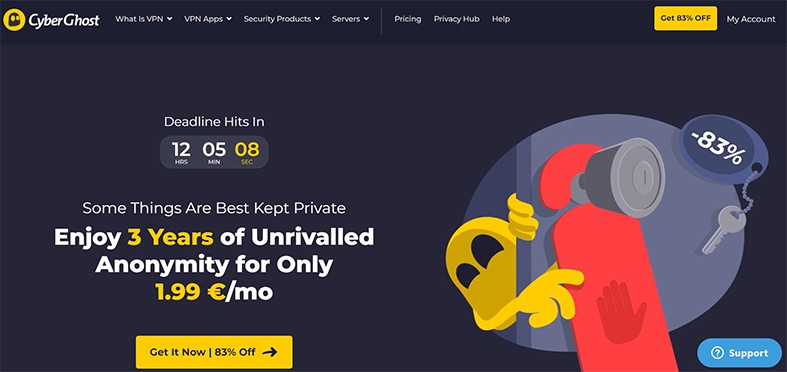
Internet users who want to sign up for CyberGhost can do so by paying $12.99 per month for the one-month plan, $4.29 per month for the one-year plan, $3.25 per month for the two-year plan and $2.29 per month for the three-year plan (with three additional free months). All packages come with a 45-day money-back guarantee except for the monthly option, which extends for 14 days.
| Term | One-Month Plan | One-Year Plan | Two-Year Plan | Three-Year Plan |
|---|---|---|---|---|
| Cost | $12.99 | $4.29 per month | $3.25 per month | $2.29 per month |
CyberGhost is mostly a trustworthy VPN service with above-average reviews from most publications. The company operates under the jurisdiction of Bucharest, Romania, which does increase the trustworthiness factor. But CyberGhost used to rank even higher before the service was purchased by Kape Technologies, a firm that owns several VPNs but has a history of privacy issues.
In terms of reviews, CyberGhost currently holds a rating of 4.7 out of 5 stars on Trustpilot after 15,000-plus reviews and a verified tag. On the Chrome Web Store (used for the Google Chrome extension, not the main app), CyberGhost holds 4.2 out of 5 stars after 654 ratings and over 700,000 users. Mozilla Firefox also offers CyberGhost as an add-on, with 4.1 out of 5 stars after 418 reviews and close to 60,000 users. Android users give CyberGhost a rating of 4.3 out of 5 stars on the Google Play Store, with over 138,000 reviews and more than 10 million downloads. Similarly, iOS users rate the app 4.1 out of 5 stars on the Apple App Store, with over 32,000 ratings.
3. IPVanish – Best VPN for Windows

IPVanish is a VPN service promising great connection privacy, fast customer support and high-speed security. Per Security Gladiators’ IPVanish review, the list of IPVanish advantages includes lots of connection options, a diverse server network, an excellent reputation and unlimited simultaneous connections per account. However, the disadvantages of IPVanish include low OpenVPN speeds, an old user interface and the inability to consistently unblock streaming sites like Amazon Prime.
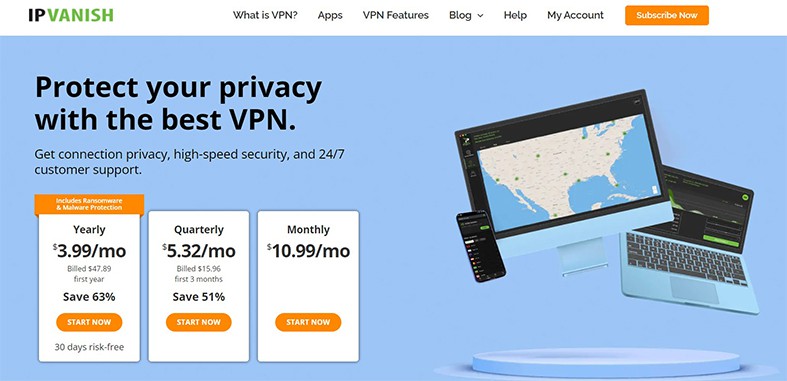
Unlike some VPNs on this list, IPVanish has a straightforward subscription structure. There are three plans. The monthly plan costs $10.99 per month, the three-month plan costs $5.32 per month and the one-year plan costs $3.99 per month. All plans come with a 30-day money-back guarantee. But keep in mind that the prices for all packages except the monthly plans change after the first subscription period ends.
| Term | Monthly Plan | Three-Month Plan | One-Year Plan |
|---|---|---|---|
| Cost | $10.99 | $5.32 per month | $3.99 per month |
IPVanish is one of the most trustworthy VPNs in the market today because of the zero-logs policy, independent audit report (that verified the zero-logs policy) and track record of offering excellent service for a decade.
IPVanish is verified on Trustpilot, with 4.6 out of 5 stars and 7,847 reviews. On the Google Play Store, IPVanish has a rating of 4.5 stars out of 5 stars after 33,900 reviews and over 5 million downloads by Android users. Similarly, on the Apple App Store, IPVanish has a rating of 4.6 after more than 91,300 reviews.
4. ExpressVPN – Best VPN for iOS

ExpressVPN is another popular virtual private network service that offers secure internet access worldwide via trusted apps. The most prominent advantages of using ExpressVPN include fast customer support, a sleek user interface, the proprietary Lightway protocol, great server performance and lots of locations. ExpressVPN’s disadvantages, however, include slightly overpriced packages and a low number of simultaneous connections per account.
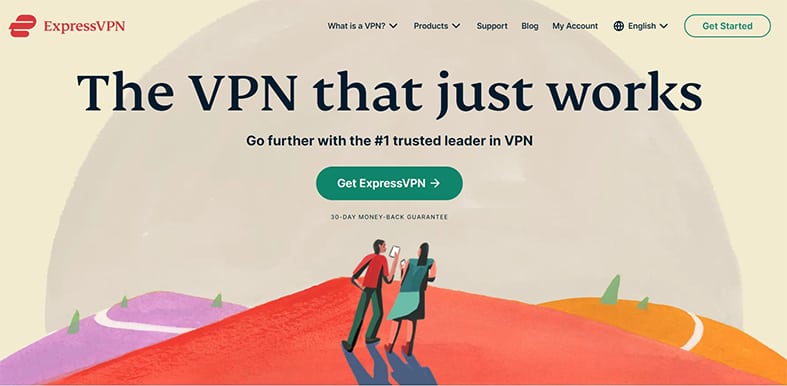
ExpressVPN offers three subscriptions: The one-month package costs $12.95 per month, the six-month plan costs $9.99 per month and the one-year option costs $8.32 per month. All come with a 30-day money-back guarantee.
| Term | One-Month Plan | Six-Month Plan | One-Year Plan |
|---|---|---|---|
| Cost | $12.95 | $9.99 per month | $8.32 per month |
Per Security Gladiators’ full ExpressVPN review, this VPN has a zero logs policy, a good reputation in the industry and an independent audit report to verify the service’s claims. ExpressVPN’s headquarters is in the British Virgin Islands, which is a plus for trustworthiness as a privacy-friendly jurisdiction. With a money-back guarantee, a large server network, few security-related issues in the past, a good company reputation and several ways to contact the service, ExpressVPN ranks high on the list of trustworthy VPNs. With that said, ExpressVPN’s ownership under Kape Technologies has been a subject of concern because the company doesn’t have a great privacy track record.
ExpressVPN has earned high marks from almost all reputable VPN review publications and aggregating platforms. ExpressVPN currently has 4.7 out of 5 stars on Trustpilot, with more than 11,000 ratings and a verified tag. The service also earned 4.7 out of 5 stars on the Chrome Web Store after 2,304 reviews and over a million downloads. Similarly, on the Firefox add-ons website, ExpressVPN has a rating of 4.5 stars out of 5 after 1,190 reviews and close to 88,000 users. Among Android users, ExpressVPN garnered a rating of 4.3 out of 5 stars after 276,000 reviews and over 50 million downloads on the Google Play Store. ExpressVPN also has an impressive score of 4.7 stars out of 5 on the Apple App Store after 204,000 ratings.
5. Surfshark – Best VPN for Android

Surfshark is one of the newcomers in the VPN industry compared to other VPNs on this list. However, the service provides many security tools and bonus features. The main advantages of Surfshark are unlimited simultaneous connections per account, fast customer support, high-performing servers on the Android app, the ability to unblock all streaming services consistently, WireGuard support on all platforms, and advanced security features such as split tunneling and multi-hop. As with any VPN service, Surfshark also has disadvantages, including inconsistent performance on the Android platform, a buggy kill switch, an expensive monthly package and an unclear privacy policy compared to other top VPNs. Security Gladiators’ dedicated Surfshark review covers these points in more detail.
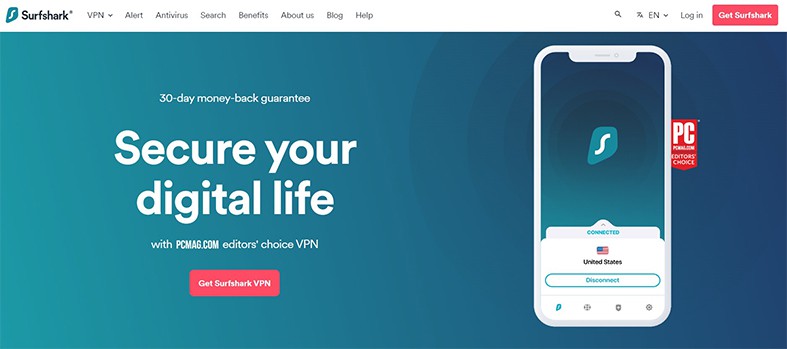
Surfshark costs $12.95 per month via the one-month package, $3.99 per month via the 12-month package and $2.49 per month on the 24-month package. Note that the rates for the 24-month package increase after the initial subscription period ends. All packages come with a 30-day money-back guarantee.
| Term | One-Month Plan | One-Year Plan | Two-Year Plan |
|---|---|---|---|
| Cost | $12.95 | $3.99 per month | $2.49 per month |
Surfshark ranks high on the list of trustworthy VPN services. The major reasons for Surfshark’s high trust are that the service is headquartered in the British Virgin Islands and has a zero-logs policy, multiple independent audits for verification, a live warrant canary (to inform users of legal requests), lots of servers (hence more availability) and a 30-day money-back guarantee (which shows confidence in the product). Surfshark gets bonus points for having almost no privacy scandal throughout the company’s years of service in the VPN industry.
Like most leading VPNs, Surfshark scores excellent marks with reputable VPN review publications. On top of that, Surfshark holds 4.4 out of 5 stars on Trustpilot after 15,048 ratings. With a verified profile on the site, Surfshark is labeled an “Excellent” VPN service. On the Google Play Store, Surfshark currently has a rating of 4.3 stars out of 5 after almost 58,000 reviews. More than 5 million people have downloaded Surfshark on the Android platform alone.
Similarly, Surfshark has 4.8 out of 5 stars on the Apple App Store, with close to 21,000 ratings. Surfshark’s Google Chrome extension is rated 2.9 stars out of 5 on the Chrome Web Store, with 364 ratings and over 800,000 users. On the official Firefox add-ons website, Surfshark holds a rating of 3.6 stars out of 5 after 520 reviews and close to 75,000 users.
6. ProtonVPN – Best VPN for Zoom

ProtonVPN is one of the premier virtual private network services using high-speed servers to safeguard the user’s privacy. The main advantages of ProtonVPN include a free subscription tier, great VPN speeds (even on the free plan), a user-friendly client, a great privacy policy, advanced privacy options and additional services such as email and storage (with extra cost). However, the main disadvantages of using ProtonVPN include slower customer support, connection problems on the mobile apps and modest discounts.
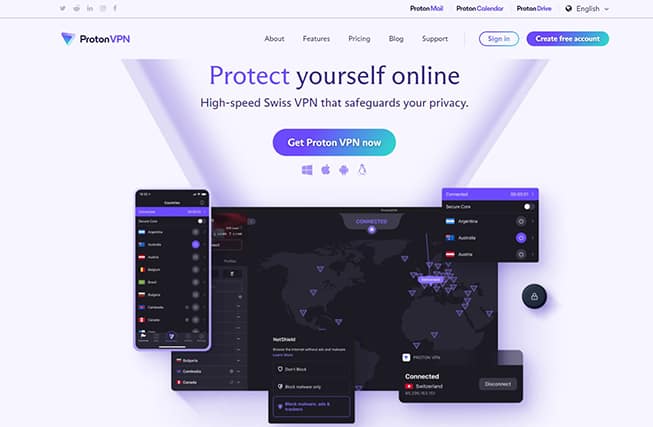
Apart from the free plan, which carries some restrictions, ProtonVPN offers the “Plus” package with three subscription prices: $9.99 for one month, $5.99 per month for one year (after which the prices will change) and $4.99 per month for two years. All packages carry a 30-day official money-back guarantee.
| Term | One-Month Plan | One-Year Plan | Two-Year Plan |
|---|---|---|---|
| Cost | $9.99 | $5.99 per month | $4.99 per month |
In terms of user trust, ProtonVPN competes with the best VPNs in the world. That’s because the founders of ProtonVPN worked at CERN as scientists, engineers and developers. The company is also based in Switzerland, which has strict data privacy laws. Even though Switzerland is in Europe, the country is not part of any of the major international data-sharing agreements, such as 14 Eyes, Nine Eyes or Five Eyes. ProtonVPN also has a zero-logs policy, a mostly clean privacy record (apart from a single hiccup a few years ago) and independent audit reports verifying the no-logs claim. ProtonVPN also provides a sizable network of over 1,000 servers spread worldwide.
Apart from solid reviews from almost all reputable VPN review publications, ProtonVPN holds a rating of 2.4 out of 5 stars on Trustpilot after 189 reviews. The company does have a verified tag on Trustpilot but is marked as a “poor” service. ProtonVPN is rated at 4.3 stars out of 5 on the Apple App Store after 5,500 ratings. On the Google Play Store, Android users have rated ProtonVPN 4.6 out of 5 stars after almost 59,000 ratings and over 10 million downloads.
7. Hotspot Shield – Best VPN for Chromebook

Hotspot Shield is considered one of the best services to protect users’ privacy and online data. Hotspot Shield earns a spot on the list of best VPNs because the service offers military-grade encryption, excellent customer support, dedicated apps on all major platforms, a free tier, and the ability to unblock in-demand streaming services such as U.S. Netflix, BBC iPlayer and Amazon Prime. Like most services, Hotspot Shield also has weak spots, which include an underdeveloped iOS app, some logs, apps performing inconsistently, a lack of content on the website and lower performance than VPNs that support WireGuard. The full Hotspot Shield review covers these pros and cons in detail.
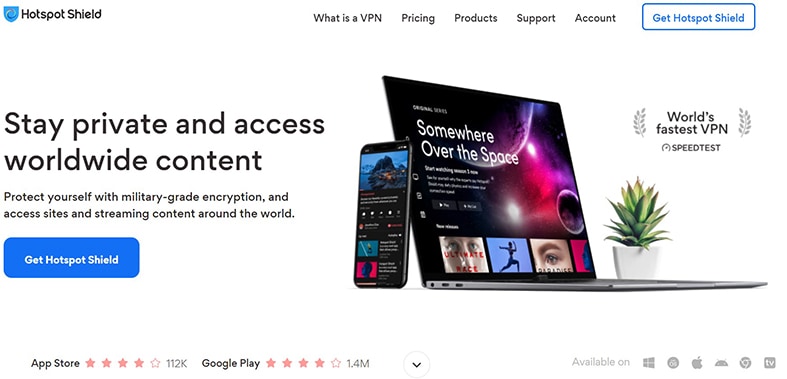
Apart from the free tier, Hotspot Shield offers two plans: The “Premium Family” option costs $19.99 per month on the monthly package and $11.99 per month on the annual package. There is also a “Premium” package that costs $12.99 per month on the monthly package and $7.99 per month on the yearly package. All packages come with a 45-day money-back guarantee. There is even a free trial of the premium service that lasts seven days.
| Term | Premium Family Plan Monthly Package | Premium Family Plan Yearly Package | Premium Plan Monthly Package | Premium Plan Yearly Package |
|---|---|---|---|---|
| Cost | $19.99 | $11.99 per month | $12.99 | $7.99 per month |
Regarding trust rate, Hotspot Shield is just below the top tier of trustworthy VPN services. That’s because the service is headquartered in the U.S., which is part of the 5-Eyes Alliance (an international intelligence-sharing agreement) and runs mass surveillance programs. Though Hotspot Shield keeps very few logs, other services keep even fewer. With that said, the number of servers, the variety of locations and the extended money-back guarantee period are more than enough to earn Hotspot some trust points. Hotspot has also undergone independent audit reports to prove that the service does not contain any identifiable logs. However, in the end, because of some questionable logging practices in the past and deceptive trade practices, Hotspot Shield’s trustworthiness falls short of the best of the best VPNs.
Hotspot Shield currently holds a rating of 4.8 out of 5 stars on Trustpilot, with 528 reviews, a verified checkmark and a label of “Excellent.” On the Google Play Store, Hotspot Shield has 4.1 out of 5 stars after 1.53 million reviews and over 100 million downloads. Apple users give the app 4.5 out of 5 stars on the Apple App Store, with 150,600 ratings in total. On the Chrome Web Store, more than 1 million users have downloaded the extension and ranked Hotspot 4.4 out of 5 stars after nearly 70,000 ratings. For the Firefox browser, the Hotspot Shield add-on has a rating of 4.2 stars out of 5, with more than 1,500 reviews and over 37,000 users.
8. Atlas VPN – Best Data Breach Monitoring

Atlas VPN is one of the best VPNs offering extra features such as data breach monitoring. Atlas VPN comes with other advantages for paying customers, including a free version, two-factor authentication, live customer support, support for WireGuard, web filters, unlimited simultaneous connections per account and the ability to unblock streaming services. No doubt, the weak points of Atlas VPN are the complex kill switch, average server network, lack of a good logging policy and a non-simplistic user interface.
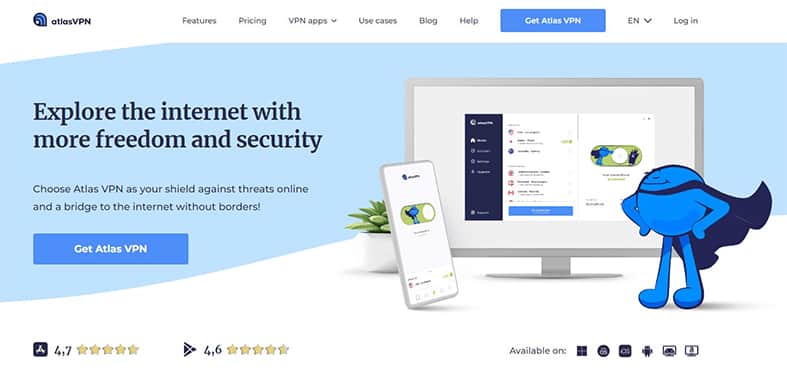
To get started with Atlas VPN, users can opt for the free tier (with some restrictions) or purchase the “Premium” package at $10.99 per month on the one-month plan and $3.29 per month on the one-year package (keeping in mind that the price increases after the first year). Selecting the three-year plan brings the cost down to $1.83 per month, with three extra months free.
| Term | Premium One-Month Plan | One-Year Plan | Three-Year Plan |
|---|---|---|---|
| Cost | $10.99 | $3.29 per month | $1.83 per month |
In terms of trust rate, Atlas VPN falls somewhere in the middle. Atlas VPN is owned by Nord Security, which also sells another leading VPN product, NordVPN. In addition to that backing, the company has a zero-logs policy in a clear privacy policy, which is great as well. Additionally, Atlas VPN recently underwent an independent audit that resulted in the service’s iOS app being declared safe and private. However, a full independent audit would be much better.
A huge problem with Atlas VPN’s trustworthiness is that the company is headquartered in the U.S., a country with a robust surveillance apparatus and membership in international data-sharing agreements such as the 5-Eyes Alliance. Also, with an average server network and a low number of locations, Atlas VPN is not trustworthy in offering the user a high-performance server in any in-demand location.
On Trustpilot, Atlas VPN holds a rating of 4.4 out of 5 stars after 172 reviews. The company does not have a verified tag but is marked as “Excellent” due to the high ratings. On the Apple App Store, Atlas VPN has a terrific rating of 4.8 stars out of 5 after more than 5,100 ratings. Atlas VPN also has a rating of 4.5 stars out of 5 on the Google Play Store, with over 86,100 reviews and 5 million downloads.
9. Private Internet Access VPN – Best VPN Crypto Trading

Private Internet Access (PIA) is a VPN service that provides tools for online privacy and data security. The most prominent advantages of using PIA include zero logging, a high number of configuration options, an advanced kill switch and no limits on torrenting. However, the disadvantages of Private Internet Access are the lack of a free tier, the inability to unblock sites like BBC iPlayer and slow speeds on some protocols. These pros and cons are further fleshed out in Security Gladiators’ full Private Internet Access review.
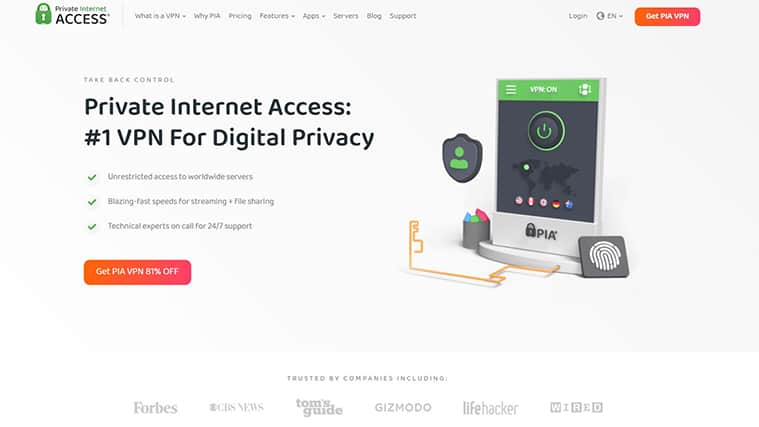
Private Internet Access has three packages: The one-month plan costs $11.95 per month and the one-year option costs $3.33 per month, while the three-year deal costs $2.03 per month and includes three additional months of VPN usage at no extra cost.
| Term | One-Month Plan | One-Year Plan | Three-Year Plan |
|---|---|---|---|
| Cost | $11.95 | $3.33 per month | $2.03 per month |
PIA’s trust rate is below-average among VPNs. The main reason for that is the fact that Private Internet Access is based in the U.S., which, as already mentioned, is not a privacy-friendly country and has signed many agreements with foreign nation states to share data. Also, even though PIA has open-source VPN apps, the effect is largely canceled out by the fact that the service still has not undergone a complete independent third-party audit. The company is also owned by Kape Technologies, a VPN conglomerate with a sketchy privacy record.
Private Internet Access does get some trust points for publishing transparency reports on a regular basis, though. PIA also does not keep any logs and has a readable privacy policy. And with over 30,000 servers and 80 locations, users can trust the VPN service to work globally and have a server nearby.
Private Internet Access has a rating of 4.6 out of 5 stars on Trustpilot with over 8,450 reviews, a verified company tag and an “Excellent” mark. For Android users, PIA has earned a rating of 4.5 stars out of 5 on the Google Play Store, with over 5 million downloads and nearly 60,000 reviews. iOS users give PIA a rating of 4.7 out of 5 stars on the Apple App Store after over 90,000 ratings. PIA is also available as a Firefox add-on, rated 3.6 out of 5 stars after 277 reviews and over 11,000 user downloads. On the Chrome platform, PIA has a rating of 3.5 stars out of 5 after 495 ratings and 200,000 downloads via the Chrome Web Store.
10. Norton Secure VPN – Best VPN with Dynamic IP Addresses

Norton Secure VPN is a virtual private network service that protects users’ private information (such as passwords, bank details and financial information) on a wide variety of platforms. The pros of Norton Secure VPN include an ad-blocking component, advanced security features such as split tunneling, network hack detection, a modern user interface and lots of subscription packages for different users. As far as the disadvantages go, Norton Secure VPN has a low number of server locations and a lack of configuration options related to the multi-hop feature. And even though the apps are easy to use, Norton Secure VPN doesn’t do a great job of unblocking major streaming services and falls short of the speed required for streaming content without buffering.
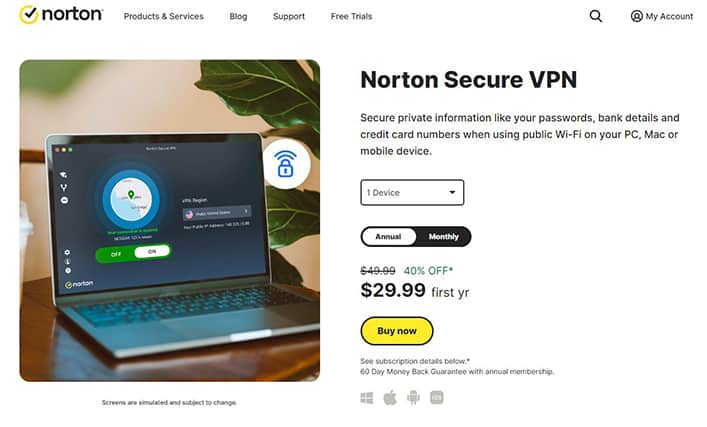
Norton Secure VPN differentiates subscription packages by the number of devices the user wants support for. For a single device, Norton Secure VPN costs $4.99 per month or $29.99 per year with the one-year plan discount. (Prices change substantially after the first year’s discount window ends.) For users wanting to protect up to five devices per account, the monthly option costs $7.99 and the annual deal costs $39.99 with a 50% discount. Finally, the monthly package for the 10-device deal costs $9.99 per month, while the one-year package costs $59.99 for the first year. All annual packages come with a 60-day money-back guarantee.
| Term | One-Month Plan | One-Month Plan for 5 devices | One-Month Plan for 10 devices |
|---|---|---|---|
| Cost | $4.99 | $7.99 per month | $9.99 per month |
The trust rate of Norton Secure VPN is fairly high because Norton is a cybersecurity company with a great reputation in the industry for developing top-of-the-line antivirus products. With a 60-day money-back guarantee, zero logs, a flawless reputation and over 1,000 servers, Norton Secure VPN is a trustworthy VPN service. That said, Norton Secure VPN operates out of the U.S. (which, as mentioned above, is bad for privacy) and hasn’t had an independent third-party audit yet.
Norton, the company behind Norton Secure VPN, currently holds a rating of 3.4 out of 5 stars after 1,623 reviews on Trustpilot. The company does have the verified mark next to the official name but is ranked as “Average.” On the Google Play Store, Norton Secure VPN has a rating of 4.4 out of 5 stars after 242,000 reviews and over 10 million downloads. iOS users give the VPN 4.3 out of 5 stars on the Apple App Store, with 68,700 ratings in total.
11. Ivacy – Most Affordable

Ivacy is a VPN service that helps users gain privacy and data security online on the cheap with extra features. The main advantages of Ivacy include the ability to unblock popular streaming websites such as U.S. Netflix and Amazon Prime Video, huge discounts, good WireGuard implementation and a diverse set of VPN server locations. However, there are a few disadvantages, such as unimpressive speeds, no advanced security features such as multi-hop, a dated interface and long connection times.
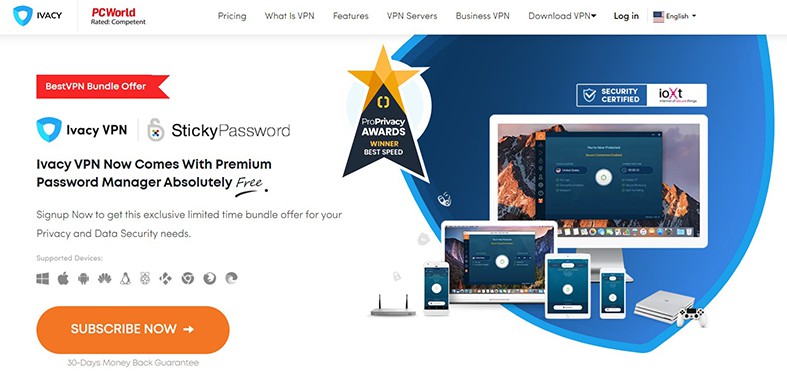
Ivacy offers three packages: The one-month plan costs $9.95 per month, while the one-year plan only costs $3.99 per month. The five-year plan brings down the price to $1.19 per month, offering a massive 88% discount and the perk of using the Ivacy Password Manager for free. All Ivacy packages come with a 30-day money-back guarantee.
| Term | One-Month Plan | One-Year Plan | Five-Years Plan |
|---|---|---|---|
| Cost | $9.95 | $3.99 per month | $1.19 per month |
In terms of trust rate, several VPN services are better than Ivacy. That’s because Ivacy is based in Singapore (a country part of the 14-Eyes data sharing alliance), hasn’t undergone an independent audit and does not publish transparency reports. Still, Ivacy does have a standard money-back guarantee and over 3,000 servers, adding to the VPN’s trustworthiness in working anywhere.
On Trustpilot, Ivacy has a rating of 4.7 out of 5 stars after 2,087 reviews. Trustpilot has marked the service as “Excellent” and provided the verified company checkmark. Additionally, Ivacy has a rating of 4.3 out of 5 stars on the Google Play Store after about 6,000 reviews and over 500,000 downloads. Ivacy VPN also has a rating of 4.1 out of 5 stars after 746 ratings on the Apple App Store. Google Chrome users can download the Ivacy extension from the Chrome Web Store, where Ivacy VPN has a rating of 3.3 out of 5 stars after 123 reviews with over 40,000 users. On the Firefox add-ons website, Ivacy VPN holds a rating of 2.9 stars out of 5 after 75 reviews and 3,834 downloads.
Note:
Prices may differ from the ones shown as new plans and deals are launched on a regular basis. Please be sure to check the most current price on the official website.What is a VPN?
The term VPN stands for virtual private network. For the modern internet user, a VPN establishes a secure and private network connection that keeps the user’s IP address, internet traffic and data private from third parties, even on public WiFi networks. With global server connections, advanced encryption and other security functions, VPN software applications protect users’ online privacy and internet connection via encryption.
What is the Best VPN for Streaming?
The best VPN services for streaming are given below.
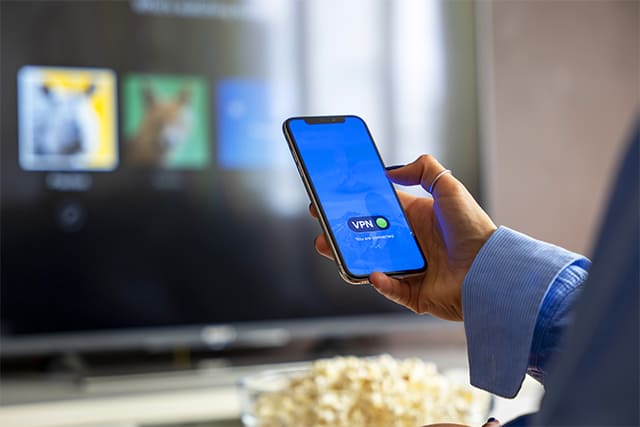
- ExpressVPN (Best Overall): With fast servers, a great reputation, streamlined apps and consistent unblocking ability, internet users cannot go wrong with ExpressVPN.
- NordVPN (Best for Security): NordVPN is the best VPN for privacy and security. However, NordVPN is also a great option for streaming because of the VPN’s huge server network, comprehensive apps, ability to work with U.S. Netflix regularly and support for FireStick.
- PrivadoVPN (Best New VPN): PrivadoVPN offers a great kill switch feature, WireGuard support, the ability to unblock Netflix and Disney, plus a free tier.
What is the Best Free VPN Service?
The best free VPN services are given below.
- ProtonVPN (Best Overall): ProtonVPN is without a doubt the best free VPN service, and by quite some margin. The level of security, privacy and advanced security options make ProtonVPN’s free tier offering almost as good as some of the paid VPNs.
- PrivadoVPN (Best New VPN): Just like ProtonVPN, PrivadoVPN also has a free tier. While ProtonVPN doesn’t limit the amount of data the user can transfer, PrivadoVPN does. With 10 GB allotted for the month and no requirement of any payment details, PrivadoVPN is the second best free VPN available today.
- WindscribeVPN (Best for Reliability): Windsrcribe has been offering a free tier for a long time. The service is as secure as VPNs come and offers advanced security features such as double-hop encryption and shared and static IP addresses, along with the tools to consistently unblock sites like Netflix in the U.K. and the U.S.
What is the Most Expensive VPN?
Sometimes, the most expensive VPN may be an option for users who have the cash to burn. The most expensive VPNs are listed below.
- Astrill VPN (Best Overall): The monthly package for Astrill VPN costs around $25 per month. Other VPNs may be more expensive but not genuine or even legitimate. Astrill VPN is the most expensive genuine VPN service. A monthly subscription to Astrill VPN costs more than twice the average VPN in the market today. The one-year and six-month packages are expensive as well, each costing $12.50 and $16.67 per month, respectively.
- Hotspot Shield (Best for Budget Buyers): Hotspot Shield may have a free tier and good discounts on some of the longer subscription packages, but the monthly cost is $12.99. That price is slightly over the industry average of around $10–$11 per month.
- Surfshark (Best VPN for Netflix): Among the leading VPN services, Surfshark is the third most expensive in the market today if the user wants to purchase a monthly subscription plan. Even though Surfshark is cheap on the longer packages, the monthly subscription cost of $12.95 is above the industry average.
Changing the criteria to the cheapest available options (regardless of the length of the subscription period) changes the top three most expensive VPNs. In that case, the ranking becomes Astrill ($12.50 per month), ExpressVPN ($8.32 per month) and Mullvad ($5.50 per month).
What is the Difference Between a Free VPN and a Paid VPN?
The main difference between a free VPN and a paid VPN is evident in the names. Free or “freemium” VPNs do not charge any money from the end user, while paid VPNs require a subscription for premium service and extra features. However, many free VPNs are offered by security companies with reputable paid VPNs, with the goal being to lure the end user into purchasing a subscription in the near future.
Another difference is the availability of security tools. Historically, free VPNs haven’t offered the same level of strong protocols and encryption standards as paid VPNs. Now, even some free VPNs support OpenVPN and WireGuard protocols. But the difference today is the encryption used, with most paid VPNs adopting 256-bit encryption for data protection. Most free VPNs in the market either do not use encryption or use 128-bit encryption. Apart from the top free VPNs, most free VPNs only offer outdated protocols such as PPTP or IPSec/L2TP.
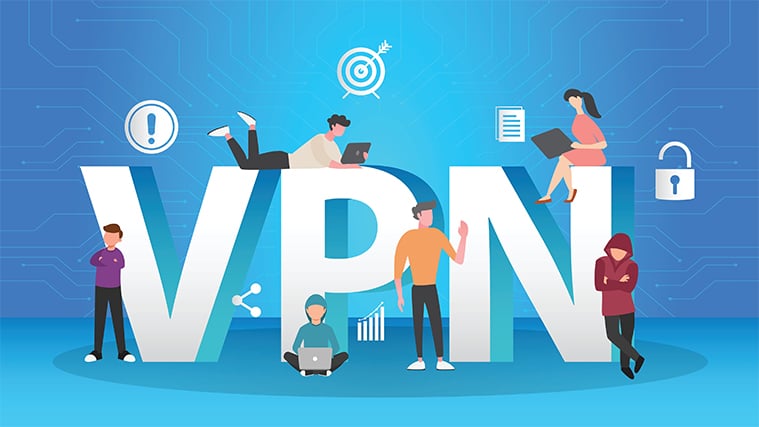
The most critical difference between a free VPN and paid VPN is how each handles user privacy. Free VPNs usually log and sell users’ data to third-party companies. Paid VPNs usually have a zero-logs policy mentioned in a privacy policy document. Free VPNs may also claim zero logs. The only way to know for sure if a VPN is telling the truth is to check for an independent audit report. Granted, not all paid VPNs have audit reports, but the number of free VPNs is even lower.
This is important:
Generally, readers should understand that a paid VPN doesn’t benefit much from keeping logs since the service can make money in other ways (subscription fees and writing security reports). On the other hand, free VPNs do have a lot of incentives to store users’ data and sell the information to advertisers since free VPNs cannot make money from subscriptions.One other point in the age-old free VPN vs paid VPN debate is streaming capability. Users who want to stream geo-restricted content on U.S. Netflix, Disney Plus, ESPN+, Hulu and Amazon Prime Video from any country worldwide would need to sign up for a VPN capable of unblocking those services. Free VPNs usually lack the necessary infrastructure (fast servers or enough servers to bypass VPN blacklists) to unblock popular streaming services consistently. Apart from that, very few free VPNs can support streaming without a lot of buffering.
Finally, free VPNs cannot compete with paid VPNs in terms of quality. Paid VPNs never show users ads, while free VPNs do. Free VPNs come with restrictions such as data transfer, bandwidth limits and server connection limits. Paid VPNs have no such limits. Free VPNs generally have less than 50 servers and five locations on average. Paid VPNs have servers in the thousands and locations in the hundreds. Free VPNs, such as Hola, have also been known to act as a botnet/malware. Hola VPN once compromised users’ devices, made the device part of a botnet and launched DDoS attacks around the world. The chances of such problems happening with a paid VPN are low. Paid VPNs also have great customer support options when something goes wrong. Usually, paid VPNs have live chat support, an email option, social media accounts and a remote-access problem-solving option. But without subscription revenue, no free VPN can afford to have staff available 24/7 to help customers.

